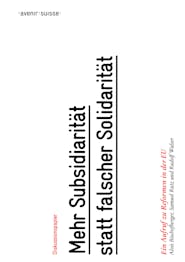«More Subsidiarity rather than sham Solidarity: An Appeal for Reform in the EU». As the title suggests, Avenir Suisse’s new Discussion Paper looks at the current economic state of the EU and its future development. The publication stems from a project by Businesseurope, the umbrella organisation for Europe’s employers’ federations. The paper on the one hand seeks ways out of the current crisis, but also casts a critical eye on the long term structures of the EU – particularly monetary union.
Alois Bischofberger, Samuel Rutz and Rudolf Walser, joint authors, start by looking at how the EU to into such a mess, despite all its noble aims and targets. Brussels’ dual strategy of financial assistance and austerity showed leadership in difficult times. But the crisis still hasn’t been overcome, and the EU is now suffering from over-indebted national budgets and the inadequate competitiveness of many member states Moreover, the European Central Bank risks overtaxing its monetary policy tools. As a result, it is uncertain whether the reformed stability and growth pact and the fiscal accord would, in a serious situation, have the bite to match their bark. The EU’s ever more complex and opaque rules, and the revived debate – particularly in France and Italy – about the drawbacks of austerity leave room for doubt.
But where should the EU head if it wants to strengthen its institutions and business in its member states? There are four basic options:
- Creating a fiscal union with unified European governance of business and economics.
- Expanding co-operation based on «variable geometry» (with different member states proceeding with integration at different speeds).
- Strengthening the Maastricht treaty and expanding monetary union into a banking union. (Maastricht 2.0).
- Rigorous subsidiarity.
The first option – fiscal union with unified European governance of business and economics – seems unrealistic for the foreseeable future. By contrast, all the other alternatives are feasible. The EU has the necessary legal framework and instruments to pursue «variable geometry», to strengthen the Maastricht treaty, or to push through rigorous subsidiarity. Irrespective of which path, or combination, is chosen, successful reforms will depend on two factors: Broad consensus on the goals, and improvements in co-ordinating political and economic targets with the wishes of EU citizens themselves.
The political will to implement the EU’s existing rules and regulations, in spite of clouded economies and geopolitical tensions, will be decisive. It will be more important, in terms of regaining the trust of key economic figures and reinforcing the credibility of EU leaders, than yet more high sounding visions and utopian goals. A clear and lasting European identity can only be created on this basis. According to Avenir Suisse, rigorous and systematic subsidiarity, coupled with «variable geometry», offer the outlook that best matches Europe’s diversity. And the latter, after all, is what sums up the continent’s strengths and charm.
For more information:
Alois Bischofberger, Senior Consultant, alois.bischofberger @avenir-suisse.ch, 044 445 90 00
Samuel Rutz, Deputy Director, samuel.rutz@avenir-suisse.ch, 044 445 90 62
Rudolf Walser, Senior Consultant, rudolf.walser@avenir-suisse.ch, 044 445






